Yerra Sugarman

Photo by Bernard Gotfryd
Bio
Yerra Sugarman is the author of two poetry collections, both published by The Sheep Meadow Press: Forms of Gone (2002) and The Bag of Broken Glass (2008). She is the recipient of many awards, such as the PEN/Joyce Osterweil Award, two prizes from the Poetry Society of America, a Glenna Luschei Prairie Schooner Award, a Canada Council for the Arts Grant for Creative Writers, a Chicago Literary Award for Poetry, and a "Discovery"/The Nation Poetry Award. Her poems, translations, and critical articles have appeared in such publications as The Nation, Prairie Schooner, Cimarron Review, The Massachusetts Review, Poetry International, Literary Imagination, ACM Another Chicago Magazine, Pleiades, Lyric, Journal of Feminist Studies in Religion, How2, The Oxford Encyclopedia of American Literature, as well as in the French journals Siècle 21 and Europe. She lives in New York City, and currently teaches poetry at Rutgers University.
Author's Statement
In his poem, "Asphodel, That Greeny Flower," William Carlos Williams writes that "It is difficult / to get the news from poems / yet men die miserably every day / for lack / of what is found there." It is along the path to discovering "what is found there" that I plan to search for fresh ways through which to impart my concerns.
I am grateful to the NEA for awarding me this fellowship, particularly at this point in my career. It offers me the gift of time, time to work on two manuscripts-in-progress, time to think about new directions for my poems, and time to consider how the world can enter my writing in unexpected ways. The fellowship is a form of luminosity, which will help me shed light on what has most challenged me.
The subtext of much of my poetry originates in, and continues to deal with, my experience of having grown up in a colony of Jewish Holocaust (Shoah) survivors as the daughter of survivors. My work has dealt with history, loss, and memory, with the concept of vicarious witness, which the scholar Marianne Hirsch refers to as "postmemory," and which she defines as "the relationship of children of survivors of cultural or collective trauma to the experiences of their parents …that are so powerful, so monumental, as to constitute memories in their own right."
From Journal: Rai'ut Coma Ward, Tel Aviv-Yaffo, July 2003
for my Aunt
“…The problem is
to connect, without hysteria, the pain
of any one's body with the pain of the body's world…”
--Adrienne Rich, “Contradictions: Tracking Poems”
[July 7 2003, Coma Ward, Reflection]
What do we call it,
the light that prisms and keeps
opening its monarch wings, and won’t
fold them or let them be
pinned down even as grief
fastens itself to us--regardless of this;
that lunatic light polishing the shell
of a house, handfuls of room, a teaspoon full--
the light’s indifferent ardor keeps perusing--pitched
far from the mouth
of a sink, where a woman stood--stands still,
perhaps--rinsing peas
in a plastic colander, now in an archive of heat
lit by another wick of light.
Light is its own architect. Its own
contractor dismantling chambers
of the heart to make it an aviary--its own
wrench--converting hallowed space for hollow bone
and wingspan. It is its own
sickle threshing the violets
of shadows from feet. Its own
general and chief, whose strong jaws reveal something
like pearls inside the shell
of an empty room.
What to call the silence
whose syllables are spades,
whose flushed skin is an orchard's flushed skin?
Gripped by light,
the steam
of Turkish coffee climbing the trees,
bandaging their bark,
lesions where ladders lean
like tongues tasting
peaches swollen on the branches--
*
How to say the wounded
days try
to be faithful, that they're not
staunched, yet beautiful,
the sheerness of their iris and plume,
mandarin and thistle, though the sky keeps
falling, bleeding through rice-
white clouds, falling;
to say memory--mint she'd planted
still growing on its sill--
dull coins of it in paper cups;
how dahlias flowered
near the tomb; a star's
a searchlight; the night a torn dress.
July--we word our days. We name them
willow ash,
ache of bells,
maze,
cars ablaze, exile, the living dead,
armies of boys--fire stroking their faces, children.
And our sentences bare themselves
to stay perched
on the lines of our salt
sharp pages, to stay steady, be luminous.
But what happens
when language can no longer bear us?
(from The Bag of Broken Glass, published by the Sheep Meadow Press)

